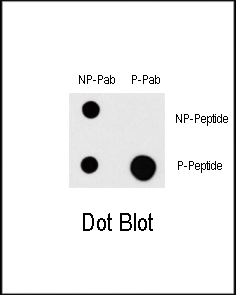Phospho-MAP3K1(T1383) Antibody
Affinity Purified Rabbit Polyclonal Antibody (Pab)
- SPECIFICATION
- CITATIONS: 2
- PROTOCOLS
- BACKGROUND

Application
| DB, E |
|---|---|
| Primary Accession | Q13233 |
| Other Accession | Q62925, P53349 |
| Reactivity | Human |
| Predicted | Mouse, Rat |
| Host | Rabbit |
| Clonality | Polyclonal |
| Isotype | Rabbit IgG |
| Calculated MW | 164470 Da |
| Gene ID | 4214 |
|---|---|
| Other Names | Mitogen-activated protein kinase kinase kinase 1, MAPK/ERK kinase kinase 1, MEK kinase 1, MEKK 1, MAP3K1, MAPKKK1, MEKK, MEKK1 |
| Target/Specificity | This MAP3K1 Antibody is generated from rabbits immunized with a KLH conjugated synthetic phosphopeptide corresponding to amino acid residues surrounding T1400 of human MAP3K1. |
| Dilution | DB~~1:500 E~~Use at an assay dependent concentration. |
| Format | Purified polyclonal antibody supplied in PBS with 0.09% (W/V) sodium azide. This antibody is purified through a protein A column, followed by peptide affinity purification. |
| Storage | Maintain refrigerated at 2-8°C for up to 2 weeks. For long term storage store at -20°C in small aliquots to prevent freeze-thaw cycles. |
| Precautions | Phospho-MAP3K1(T1383) Antibody is for research use only and not for use in diagnostic or therapeutic procedures. |
| Name | MAP3K1 |
|---|---|
| Synonyms | MAPKKK1, MEKK, MEKK1 |
| Function | Component of a protein kinase signal transduction cascade (PubMed:9808624). Activates the ERK and JNK kinase pathways by phosphorylation of MAP2K1 and MAP2K4 (PubMed:9808624). May phosphorylate the MAPK8/JNK1 kinase (PubMed:17761173). Activates CHUK and IKBKB, the central protein kinases of the NF-kappa-B pathway (PubMed:9808624). |

Provided below are standard protocols that you may find useful for product applications.
Background
Component of a protein kinase signal transduction cascade. Activates the ERK and JNK kinase pathways by phosphorylation of MAP2K1 and MAP2K4. Activates CHUK and IKBKB, the central protein kinases of the NF-kappa-B pathway.
References
Dasse,E., Leukemia 21 (4), 595-603 (2007)
Yu,F., PLoS Pathog. 3 (3), E44 (2007)
Wu,Y., Oncogene 25 (42), 5787-5800 (2006)
If you have used an Abcepta product and would like to share how it has performed, please click on the "Submit Review" button and provide the requested information. Our staff will examine and post your review and contact you if needed.
If you have any additional inquiries please email technical services at tech@abcepta.com.














 Foundational characteristics of cancer include proliferation, angiogenesis, migration, evasion of apoptosis, and cellular immortality. Find key markers for these cellular processes and antibodies to detect them.
Foundational characteristics of cancer include proliferation, angiogenesis, migration, evasion of apoptosis, and cellular immortality. Find key markers for these cellular processes and antibodies to detect them. The SUMOplot™ Analysis Program predicts and scores sumoylation sites in your protein. SUMOylation is a post-translational modification involved in various cellular processes, such as nuclear-cytosolic transport, transcriptional regulation, apoptosis, protein stability, response to stress, and progression through the cell cycle.
The SUMOplot™ Analysis Program predicts and scores sumoylation sites in your protein. SUMOylation is a post-translational modification involved in various cellular processes, such as nuclear-cytosolic transport, transcriptional regulation, apoptosis, protein stability, response to stress, and progression through the cell cycle. The Autophagy Receptor Motif Plotter predicts and scores autophagy receptor binding sites in your protein. Identifying proteins connected to this pathway is critical to understanding the role of autophagy in physiological as well as pathological processes such as development, differentiation, neurodegenerative diseases, stress, infection, and cancer.
The Autophagy Receptor Motif Plotter predicts and scores autophagy receptor binding sites in your protein. Identifying proteins connected to this pathway is critical to understanding the role of autophagy in physiological as well as pathological processes such as development, differentiation, neurodegenerative diseases, stress, infection, and cancer.

